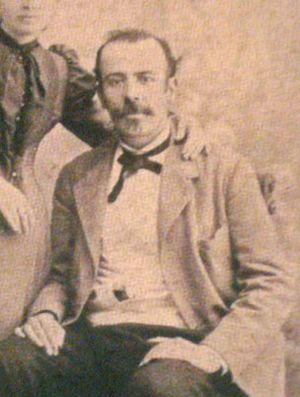Demófilo facts for kids
Antonio Machado Álvarez, known by his pen name Demófilo, was a Spanish writer, anthropologist, and expert in folklore. He was born in Santiago de Compostela in 1848 and passed away in Seville on February 4, 1893. His mother, Cipriana Álvarez Durán, was also a well-known folklorist.
A Life of Learning
Antonio Machado Álvarez grew up in a family of scholars. His mother, Cipriana Álvarez, was the niece of Agustín Durán, a famous writer who collected Spanish narrative poems called romanzas. His father, Antonio Machado, was a university professor of Natural Sciences at the University of Seville.
Antonio spent most of his life in Seville. There, he studied philosophy and law. One of his teachers, Federico de Castro, sparked his interest in evolution and the ideas of a philosopher named Karl Christian Friedrich Krause. Later, Antonio became interested in the social ideas of Herbert Spencer, which focused on how society could be useful to people.
He worked as a professor of Metaphysics at the University of Seville for a short time. He also served as a judge. Later, he became a professor of Folklore at the Free Institution of Education in Madrid. He wrote many articles about popular literature for a magazine called Monthly Magazine of Philosophy, Literature and Sciences from 1869 to 1874.
In 1892, because he needed money, he traveled to Ponce, Puerto Rico. He worked there as a property recorder, even though he was already very sick. He died on his way back to Spain on February 4, 1893, when he was only 47 years old.
Antonio Machado Álvarez and his wife, Ana Ruiz, had five children. Two of their sons, Manuel and Antonio Machado, became famous poets.
Studying Spanish Traditions
In 1871, Antonio joined the Sevillian Anthropological Society. His father was one of the founders of this group. In 1872, using the pen name Federico de Castro, Antonio published a book called Popular stories, legends and customs. He was very interested in folklore, which helped him create a special section on popular literature in La Enciclopedia (The Encyclopedia) magazine, starting in 1877.
When the first folklore society was created in London in 1878, Antonio had an idea. He wanted to create something similar in Spain. So, on November 3, 1881, he announced the "Founding of the Organization for Spanish Folklore." This group aimed to collect and study popular knowledge and traditions. This led to the creation of El Folclore Andaluz (The Folklore of Andalusia). Soon, other local societies were formed across Spain, focusing on the unique traditions of different regions.
In 1882, he started a monthly magazine with the same name, El Folclore Andaluz. It was later renamed El Folclore Bético-extremeño. You can still find copies of it today.
Antonio Machado Álvarez had a modern way of thinking about folklore. He knew English and translated important books about anthropology, like one by Edward Burnett Tylor. Antonio defined folklore as:
- This is, for me, the science that intends to study of undifferentiated or anonymous humanity, to start off from an age that can be considered infantile to the present time.
In Madrid, he managed a series of books about folklore called the Library of Popular Traditions (1883-1888). This collection grew to eleven volumes. He also published a collection of riddles and studied flamenco music. His collection of flamenco songs was the first book to gather these poetic songs.
He translated several important books from English and French. These included Folk Medicine by William George Black and Anthropology by Edward B. Tylor. He also translated Research on the History and Literature of Spain during the Middle Ages by Reinhart Dozy. Antonio kept in touch with other important scholars like Hugo Schuchardt, Teófilo Braga, and Manuel Murguía.
His Books
Antonio Machado Álvarez wrote and collected many important works. Here are some of them:
- Obras Completas (Complete Works), published in 2005.
- Biblioteca de las Tradiciones Populares Españolas (Library of Spanish Popular Traditions), a multi-volume series published from 1883 to 1888. This collection included:
- Introductions and stories by Antonio Machado Álvarez.
- Information on Andalusian festivals and customs.
- Children's games from Extremadura.
- Studies on folklore from Galicia.
- Collections of popular songs from Galicia.
- Popular stories from Extremadura.
- "El folclore del niño" (Children's Folklore), published in España magazine.
- Colección de cantes flamencos (Collection of Flamenco Songs), first published in 1881. This book has been reprinted many times.
- Colección de enigmas y adivinanzas (Collection of Enigmas and Riddles), 1833.
- Estudios sobre la literatura popular (Studies on Popular Literature), 1884.
- Batallas del libre pensamiento (Battles of Free Thought), 1885.
- Artículos varios (Various Articles), 1904.
- Cuentos, leyendas y costumbres populares (Popular Stories, Legends, and Customs), published in 1872 under the name "Federico de Castro."
- Adivinanzas francesas y españolas (French and Spanish Riddles), 1881.
See also
 In Spanish: Antonio Machado Álvarez para niños
In Spanish: Antonio Machado Álvarez para niños
 | Isaac Myers |
 | D. Hamilton Jackson |
 | A. Philip Randolph |


